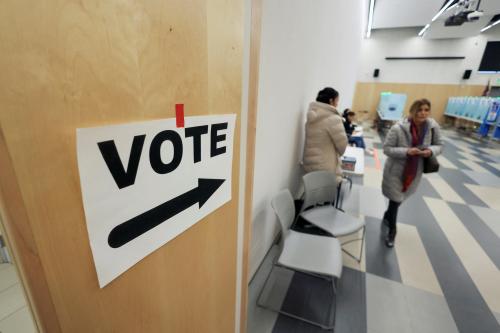This excerpt is from Saving Ourselves: From Climate Shocks to Climate Action by Dana R. Fisher (Columbia University Press, 2024)
Ever since President Jimmy Carter put on a cardigan and told everyone to turn down their individual thermostats, many have leaned into personal behaviors to reduce energy consumption. This call for individual action by the president in February 1977 was motivated by the oil crisis of the 1970s. Attention has refocused more recently on the role that individual behaviors play in energy consumption as part of the necessary responses to climate change.
There is no question that individual behavior change is an important tool in the arsenal to stop the climate crisis. Scholars have stressed the potential of personal behavior change for many years. In their 2008 article, for example, Gerald T. Gardner and Paul C. Stern provide an overview of the research and present a short list of effective actions that individuals can take within their homes to reduce energy, as well as carbon emissions.
Kim Nicholas and colleagues have updated and expanded this work on individual behavior change. Although they explicitly recognize the role of governments in climate policymaking, the authors stress that individual actions can help to mitigate climate change. The authors list four high-impact behaviors that will substantially reduce individual carbon emissions: having one less child, living without a car, avoiding air travel, and eating a plant-based diet.
While this research focuses specifically on individual behaviors, it also recognizes that the effects of these individual actions vary by country because of the variations in political and economic systems. In Norway, for example, almost all electricity is generated by renewable hydropower (the International Energy Agency [IEA] reports it was 92 percent in 2022). Because their electricity sector does not emit substantial amounts of carbon, the Norwegian government has focused its efforts on reducing carbon emissions from its transportation sector, which accounts for almost a third of the country’s emissions. The government implemented a tax system to incentivize consumers to switch to electric vehicles (EVs): cars that are powered by oil are taxed at a higher rate so that the price of electric cars is very competitive.
This policy has been quite successful: 79 percent of new passenger cars sold in Norway in 2022 were EVs. This shift to EVs charged by carbon-free hydropower (in contrast to cars with combustion engines that run on petroleum) has led to substantial reductions in individual emissions in Norway.
Although this transition away from fossil fuel–powered cars is great news for Norway and its climate goals, such incentives only work in countries that generate most of their electricity from clean, non-carbon-emitting sources. The United States, in contrast, generates the majority of its electricity by burning fossil fuels (60.2 percent of electricity in 2022). As a result, most EVs in the United States, which accounted for only 6 percent of the market share in 2022, are charged by electric systems powered by natural gas and coal. Not unlike most other industrialized countries, the United States depends on a system that emits carbon to provide energy for businesses and homes as well as to power its transportation sector. Without a transition to non-carbon-emitting energy sources and transportation options that include expanded opportunities for public transit, a transition to electric cars will not be enough, by itself, to stop climate change.
As the variation in EV use in the United States and Norway highlights, individual-level actions can have visible and measurable effects on personal emissions, but they are mediated by political and economic systems that determine the degree to which they help combat the climate crisis. Unfortunately, Norway is one of only a small number of countries that does not rely on fossil fuels for most of its electricity. Mitigating the most harmful effects of climate change in most countries involves changing the way that energy is generated and used to fuel all aspects of life as we know it.
Even in a country like Norway that is mostly powered by clean energy, shifting individual consumption patterns can be quite difficult. In a series of papers based on data from a nationally representative survey of the Norwegian population, my colleagues and I document the limited role that climate considerations have played in choices regarding car use, leisure air travel, and red meat consumption. Our findings highlight two important facts. First, without government intervention, it is very hard to change individual behaviors. Second, although individual behavioral change can be an important tool in efforts to reduce carbon emissions, changes to the political and economic systems are needed to stop the climate crisis. Anyone who says that individual consumption choices can do it alone is trying to distract from where the power is actually concentrated.
This distraction by powerful interests has gotten a lot of attention in recent years. Not only did fossil fuel companies hide their knowledge about the effects that the growing concentrations of carbon in the atmosphere would have on the climate, they invested in efforts to redirect the focus of climate action away from themselves to the individual consumer.
As Mark Kaufman reported in 2020, fossil fuel companies developed and promoted the notion of the carbon footprint as a means of redirecting civic efforts away from the systemic level. Writing about what he calls the “devious fossil fuel propaganda we all use,” he explains how the notion of the carbon footprint helps individuals think about what they can personally “do about the climate problem. No ordinary person can slash 1 billion tons of carbon dioxide emissions. But we can toss a plastic bottle into a recycling bin, carpool to work, or eat fewer cheeseburgers.”
Investigative journalist Amy Westervelt expanded on this point in a piece in Rolling Stone: “Big Oil is trying to make climate your problem to solve. Don’t let them.”
The inherent fallacy of focusing our efforts exclusively on changing our individual behaviors is that much of the carbon consumption of an industrialized society is inextricably locked into the system. Unless we go completely off the grid and generate our own power, grow our own food, and do not connect with the rest of society, most of our carbon consumption is the product of the broader systems in which our personal and professional lives are embedded. An engineering class at the Massachusetts Institute of Technology (MIT) provided a case in point when they set out to calculate the carbon consumption of a homeless person in 2007. In their analysis, the class documented how even a destitute American who owns neither a house nor a car and lives in a homeless shelter emitted more than twice as much greenhouse gases than the global average.
The Brookings Institution is committed to quality, independence, and impact.
We are supported by a diverse array of funders. In line with our values and policies, each Brookings publication represents the sole views of its author(s).








Commentary
Taking power as individuals (and why individual climate action can’t save us)
February 13, 2024